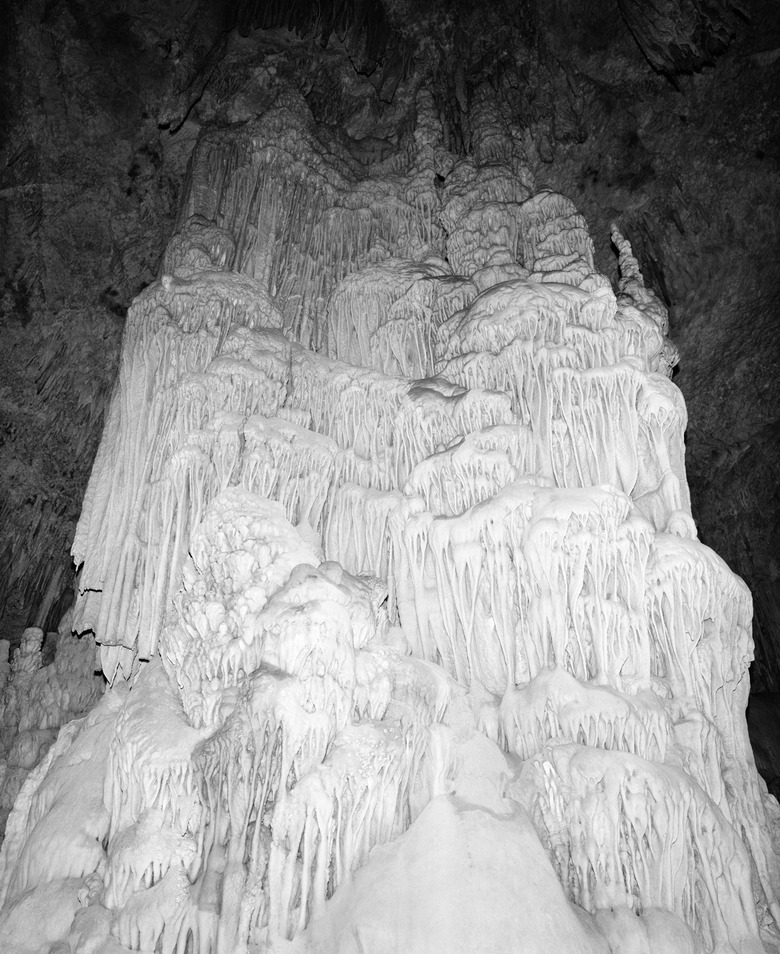How Does Weathering Break Down Rock?
Rocks located on, or near, the surface of the Earth are continuously broken down by a natural process known as weathering. Weathering breaks down rocks by mechanical, chemical and biological mechanisms. These processes often work together to accomplish the ultimate weathering of a given rock. Over time, these weathering forces can level entire mountains or carve out massive caves.
Weathering Basics
Weathering Basics
Nature features two primary destructive forces: weathering and erosion. Weathering involves the disintegration and decomposition of rocks. This occurs at, or near, the surface and always takes place where the rock is located. Erosion, on the other hand, involves the incorporation and transportation of the products of weathering by a mobile agent, such as wind or water. Weathering produces smaller pieces of rock that can either be similar in composition to the parent rock or different.
Physical Weathering
Physical Weathering
Physical weathering involves the breakdown of rock by mechanical means, typically changes in temperature and pressure. The resulting pieces retain their original composition. One of nature's primary mechanisms of physical weathering is frost wedging. Water intrudes into a rock through cracks and then freezes. This causes an expansion with pressures up to 4.3 million pounds per square foot, resulting in rock fragmentation. Exfoliation, or unloading, occurs when the pressure on a rock is reduced due to uplift or erosion. The reduced pressure causes the rock to expand, resulting in fragmentation. Thermal expansion and crystallization are also methods whereby rock is mechanically weathered.
Chemical Weathering
Chemical Weathering
Chemical weathering involves the breakdown of rock by chemical means, meaning the internal structure of the rock is altered by the addition or removal of elements. The resulting pieces have a different composition. Dissolution, or leaching, occurs when certain minerals dissolve in acidic water, such as halite and calcite. Oxidation takes place when oxygen combines with iron-bearing silicates to produce rust. This is common in mafic rocks, which are ferromagnesian in composition. Hydrolysis occurs when hydrogen, typically from carbonic acid, combines with silicate minerals, producing clay.
Biological Weathering
Biological Weathering
Biological weathering involves the breakdown of rock by chemical or physical agents of organisms. The resulting pieces may or may not retain their original composition. Root wedging is a common type of biological weathering. This occurs when roots penetrate a rock and continue to grow. The expansion pressure causes fragmentation. Animal activity, such as burrowing, can also lead to fragmentation. While these are examples of physical biological weathering, there are also types of chemical biological weathering. For example, lichen, fungus and mold can secrete acids that alter the chemical composition of rock. Organic debris can also cause chemical weathering. This occurs when carbon is released during decomposition. This carbon can combine with water to form a weak acid.
Cite This Article
MLA
Bennett, Doug. "How Does Weathering Break Down Rock?" sciencing.com, https://www.sciencing.com/weathering-break-down-rock-8714040/. 24 April 2017.
APA
Bennett, Doug. (2017, April 24). How Does Weathering Break Down Rock?. sciencing.com. Retrieved from https://www.sciencing.com/weathering-break-down-rock-8714040/
Chicago
Bennett, Doug. How Does Weathering Break Down Rock? last modified August 30, 2022. https://www.sciencing.com/weathering-break-down-rock-8714040/
